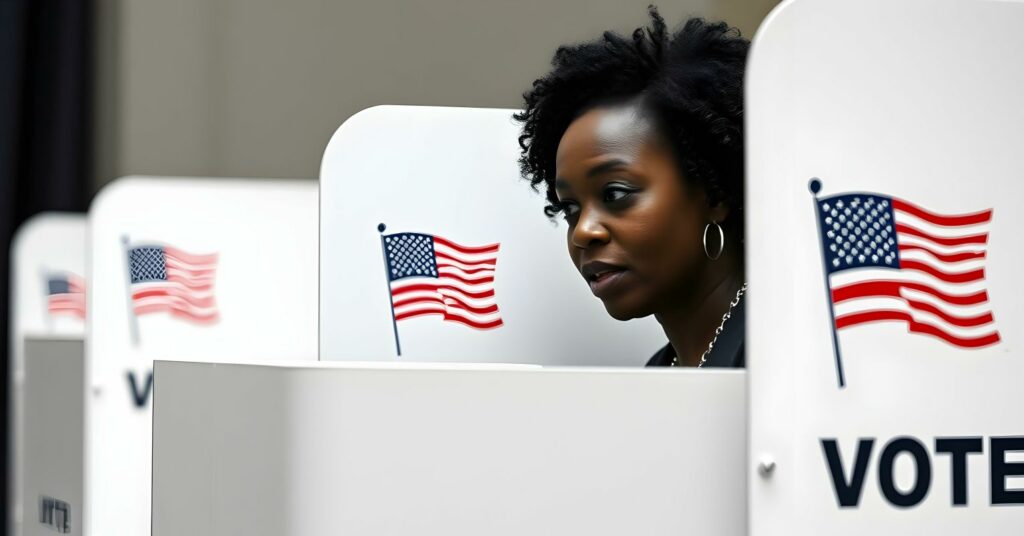Source: Everything / Adobe Stock
In less than a month, our country will elect the next president—a historic decision that will affect all of our lives. And we may even elect the first female and first Black and Indian female to the highest office in the land. While this brings excitement for many, it also brings significant anxiety.
In addition to disgust over the racist and misogynist rhetoric against Kamala Harris, there are also concerns for her safety on the campaign trail. Black women in particular are wary about potential Blacklash affecting them and their families.
Regardless of your political affiliation or leanings in this election cycle, you may be experiencing some more general election-related anxiety. An election means change, which can cause uncertainty and stir political tensions in your family, workplace, or community.
Being aware of the potential for this anxiety is key to coping with the feelings you and others may be experiencing. A recent Forbes survey found that more than 60 percent of respondents said that their mental health had either been slightly, moderately, or significantly negatively affected by the upcoming election. Women (63 percent) and younger adults were more likely to experience a negative impact, the survey found. Add rampant disinformation, barriers to voting, poll worker and voter intimidation this season to the deadly push to block the peaceful transfer of power in January 2021, and you have a potentially troubling brew.
Even if you don’t feel particularly stressed about politics right now, members of your family or community might. The 24-7 media coverage of the campaigns, debates, and issues is a constant reminder of political strife and what’s at stake. Then there are our family members and neighbors. Conversations about politics with parents, siblings, or children can get tense and lead to arguments. A neighbor’s lawn sign, flag, or bumper sticker could make you see them in a new light, and remind you of the stark political divide. If you’re involved in community organizations or local politics, meetings or gatherings could get heated. All of this is a recipe for anxiety.
Signs you might be affected by election-related stress include excessive worrying about the possible consequences, constant reading or talking about the election, physical signs like headaches, rapid heart rate or GI issues, or avoidance of the topic altogether. These feelings or behaviors may intensify as the election draws near and could get worse if election day is followed by the type of uncertainty and conflict that lasted for weeks during the 2020 cycle.
Ways to Cope with Election Stress and Anxiety
Vote. Whether you feel fired up or ambivalent about your choices in this election, be sure to vote. Remember that many people fought, went to jail, and even died to gain the right to vote. For African Americans and other people of color, that right is still under threat. Double-check your voter registration status and polling location, and make a plan to vote. Plan what time of day you’ll vote, and what you’ll do if there’s a line. Consider voting early or by mail if those are options for you. Casting your ballot will restore a sense of control that can help ease anxiety.
Learn about the issues. Being informed can also help you feel a sense of agency. In the age of partisan information, choose some non-partisan sources, like the League of Women Voters, to learn more about key issues and your elected officials. Your local Secretary of State’s office website might also offer free nonpartisan voter information like sample ballots and voter information guides.
Limit exposure to news. It’s one thing to be informed but another to spend hours compulsively scrolling for updates and checking social media. In an article I wrote about how to read the news without losing your peace of mind, I recommended picking a set time to consume news each day; double checking sources of news to make sure they’re accurate; balancing negative news by seeking positive stories; and practicing mindfulness and relaxation techniques.
Connect with like-minded folks. If you are passionate about a particular issue at stake in the election—like education, health care, or civil rights—connect with a community of people who share your views. That might be a local organization, sorority, church committee, or social media group. Join one of the many Zoom calls and groups to hear what the needs are and how you can get involved. When people come together to solve a problem, they build community, and building community is a collective response to crises and a source of social support that alleviates anxiety.
Approach conversations carefully. Choose wisely who you talk to and what you say. Acknowledge that it may be pointless to have a political debate with certain people. That doesn’t mean you have to shut them out, but consider whether they are capable of having civil discourse where you can both hear each other out. If not, don’t waste your time and energy, and talk about something else. Know that there’s a difference between having a discussion and trying to convince someone of your opinion. If you decide to engage in a political discussion, focus on listening, asking questions, and being curious. Say things like, “Tell me more.”
Also, know when to disengage. If someone grows belligerent, don’t hesitate to change the subject or end the conversation. This is an act of boundary setting and can protect your sanity and energy.
Taking these steps can help you manage anxiety, build resilience, and navigate life whatever the political outcome.
Source link : https://www.psychologytoday.com/za/blog/the-color-of-wellness/202410/election-anxiety-is-a-thing
Author :
Publish date : 2024-10-09 16:49:54
Copyright for syndicated content belongs to the linked Source.
